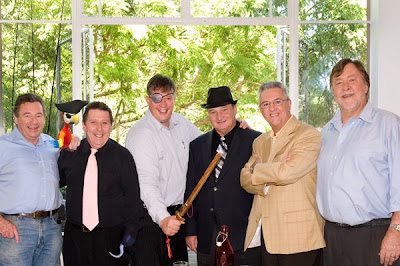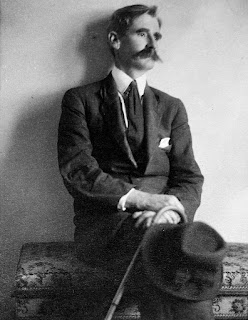Pirate Radio
I had the opportunity recently to photograph a few famous Australian radio disc jockeys who in the 1960's became active broadcasters in what was known as Pirate Radio in the United Kingdom. An interview highlighting their memories were created for a documentary soon to be broadcast on Ovation channel via Foxtels cable TV. The interviews were conducted by the very knowledgeable and dear friend, Glenn A. Baker. What an interesting thing it was to listen to the recollections of these lovable rogues. Their experiences and memories are humorous and a marvelous snapshot of that period in history.
These men were almost as popular as the rock gods whose careers they helped to launch. They were treated like royalty. They come together often for reunions, and in this instance were here in Sydney for a preview of an upcoming film about to be released called The Boat that Rocked! From the stories these DJ's spoke of, the movie's writers and producers certainly never let the facts get in the way of a good story, the reality was much more tame than was sensationalised in the film. I was so pleased to see these Pirates speak. They are a great bunch of guys and I really had a great time listening and learning.
A brief about pirate radio taken from a couple of sources is shared below. Aharr me hearrties! Pieces of eight!

Pirates from left to right: Ian MacRae, Graham Webb, Craig Peihopa (a pirate wanna be!) Norm St. John, John Kerr and Bryan Vaughan
These men were almost as popular as the rock gods whose careers they helped to launch. They were treated like royalty. They come together often for reunions, and in this instance were here in Sydney for a preview of an upcoming film about to be released called The Boat that Rocked! From the stories these DJ's spoke of, the movie's writers and producers certainly never let the facts get in the way of a good story, the reality was much more tame than was sensationalised in the film. I was so pleased to see these Pirates speak. They are a great bunch of guys and I really had a great time listening and learning.
A brief about pirate radio taken from a couple of sources is shared below. Aharr me hearrties! Pieces of eight!

Pirates from left to right: Ian MacRae, Graham Webb, Craig Peihopa (a pirate wanna be!) Norm St. John, John Kerr and Bryan Vaughan
At the beginning of the 1960s, an event occurred that changed the sound of Britain's radio forever - the growth of 'pirate' radio stations. What started out as a protest for the freedom to play music ended up challenging the British government and the BBC's rather conservative radio broadcast output. If it had not happened it is possible that commercial radio as we know it may not have been allowed to develop.
At the beginning of the 1960s there were only three national radio stations in Britain, all run by the BBC. In the spirit of public service broadcasting, the government insisted that all programmes were respectable, hopefully educational and impartial - hence the BBC was not allowed to broadcast commercials for fear that advertisers or sponsors could try to influence the quality or content of the programmes.
At the start of the 1960s the BBC played very little contemporary or 'youth-orientated' music, partly because those in charge of output were quite disparaging about pop music, and partly due to existing agreements with the Musicians Union regarding the employment of musicians, which limited the amount of recorded music that could be played. So in the evening, if you wanted to hear pop music you'd have to retune to Radio Luxembourg a commercial station that broadcast from the Grand Duchy of Luxembourg, in mainland Europe. As it was originally granted a low-powered internal frequency and was not licensed to broadcast to Britain, it paved the way for British audiences to appreciate the later pirate radio stations.
Pirate radio was started by Australian Record Label owner Allan Crawford. Allan borrowed an idea already successful in Sweden. His Radio Atlanta would be sited aboard the mv Mi Amigo, anchored in international waters, which would circumvent broadcasting legislation to bring commercial radio to the UK via a powerful on-board transmitter.
Although the station traditionally celebrates its launch over Easter each year, 27 March, 2004 marks the 40th Anniversary of the first test transmission from Radio Caroline. The station was officially opened by Simon Dee two days later on Easter Sunday 29 March, 1964.
The first ship - which was placed in the North Sea three-and-a-half miles from Felixstowe - was the 763-ton former passenger ferry MV Fredericia. On 27 April, 1964, she was joined by a smaller ship, the 370-ton coaster MV Mi Amigo, which was home to Radio Atlanta. Atlanta and Caroline were at first rival stations, though after a few weeks the two stations merged. The Fredericia sailed around the coast into the Irish sea to become Caroline North while the Mi Amigo stayed in the North Sea as Caroline South. In November 1964, the Mi Amigo was joined there by a major rival. The 780-ton American minesweeper MV Galaxy, housing Radio London.
Other ships soon followed, and stations were also set up in the old wartime forts that still stood in the Thames estuary; the result was that the British coast was soon surrounded by music. The young DJs, the majority of them just into their mid-twenties, were admired for their daring defiance of the government and rebellious choice of playlists. They played upon the 'romantic pirate' image, although in reality they were sometimes homesick or seasick. For audiences exposed to our 'Digital Age', it's difficult to explain the spirit of adventure and challenge that the pirates conveyed. Being confined on board ship for weeks at a time they developed a happy camaraderie that they communicated through their broadcasts to the listeners, a feeling of togetherness and freedom that the land-based stations could not capture. It lasted for over three years, until the Government's Marine Offences Act made it illegal for ships to broadcast within British territorial waters. The pirates were forced off the air on 14 August, 1967. All, that is, except one: Radio Caroline continued alone for another seven months.
(source BBC UK / Mary Payne - Radio London)



Comments
You look very much at home with them in the photo. ;)